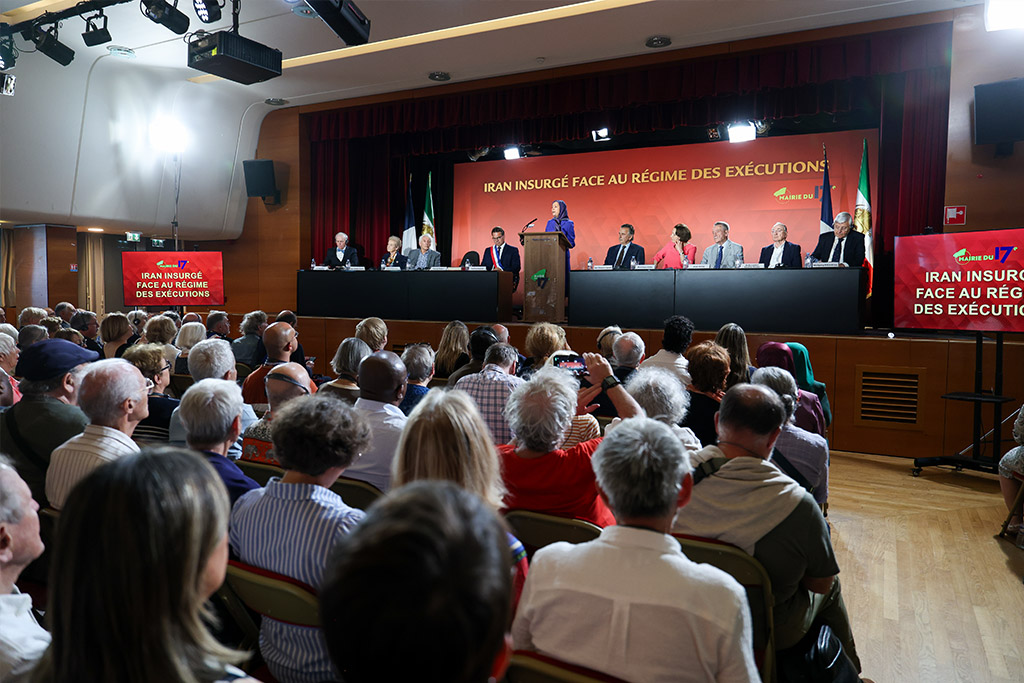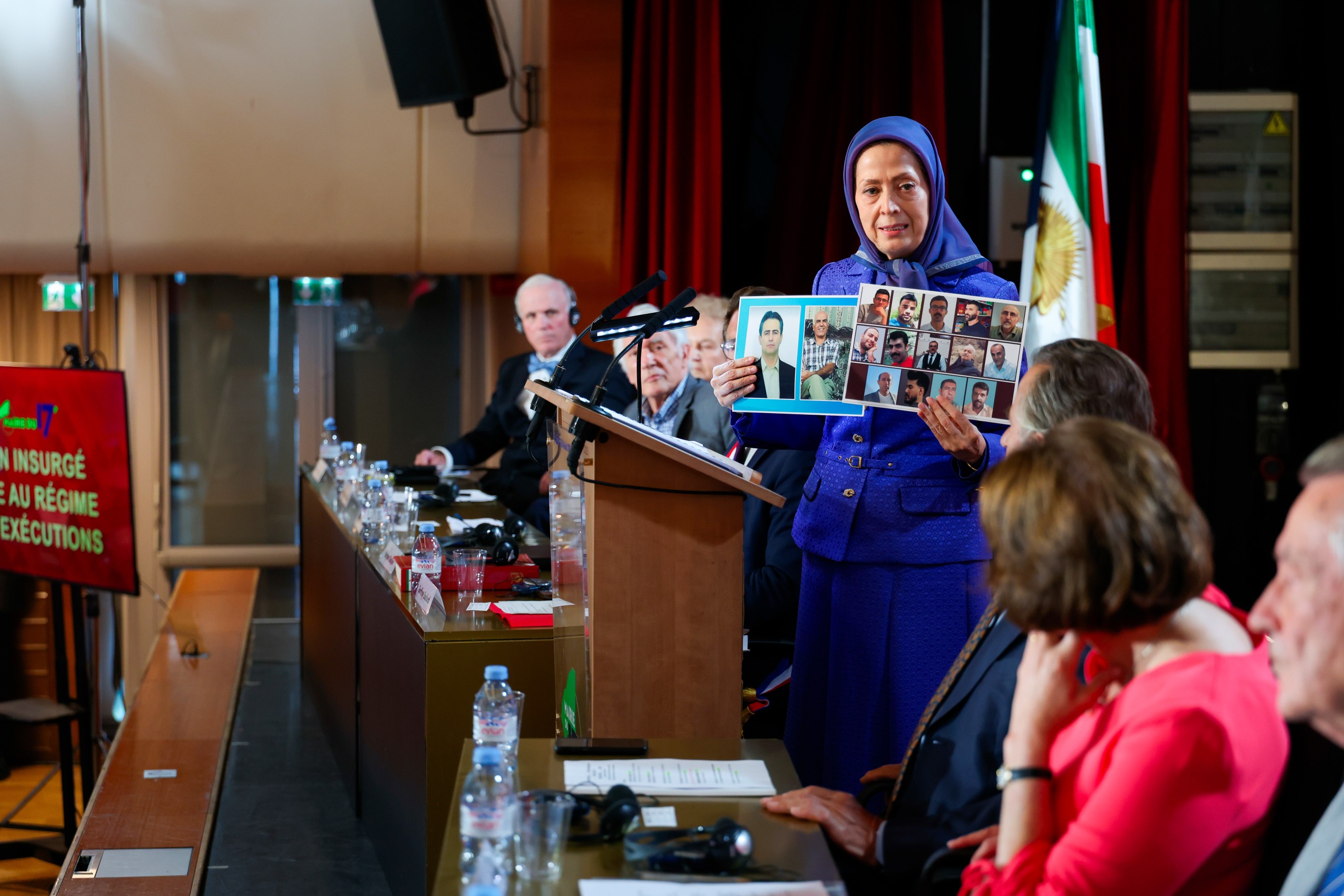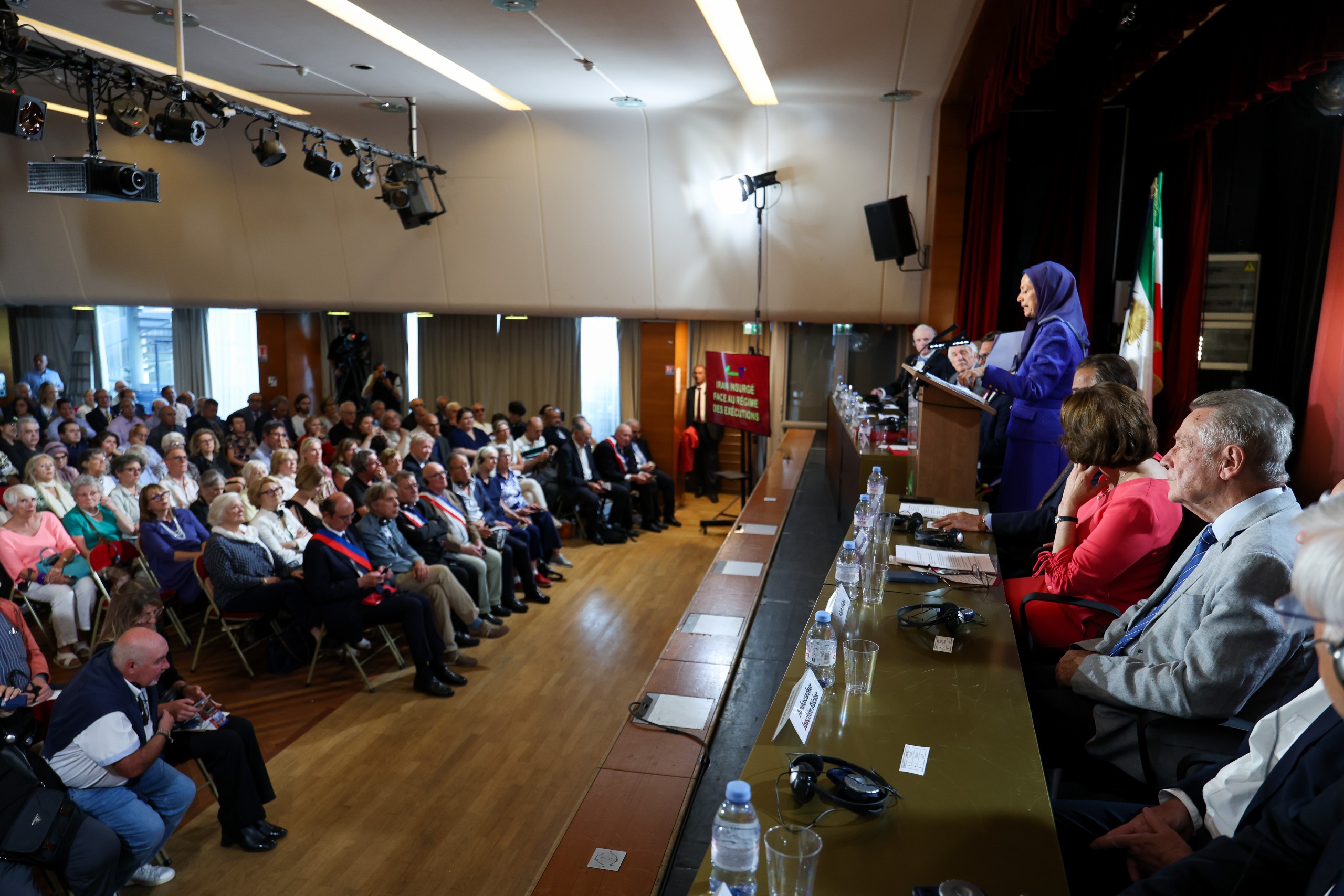Conference at the District 17 Municipality of Paris

Maryam Rajavi: The NCRI’s Plan to Guarantee Human Rights and Freedoms in the Iran of Tomorrow
Mr. Mayor Boulard,
Honored Representatives, Ladies and Gentlemen, Dear Friends,
On August 26, 1789, the French National Constituent Assembly proclaimed the Declaration of the Rights of Man and of the Citizen—an immortal milestone in humanity’s march toward liberty and justice.
And yet, how is it possible that in our time, governments continue to appease a regime that violates every principle enshrined in that Declaration?
For more than four decades, the clerical regime in my country has waged a campaign of repression and bloodshed against the people of Iran—without ever facing accountability.
The Regime’s Record of Massacres and Executions
Only a few weeks ago, two members of the People’s Mojahedin Organization of Iran—Behrouz Ehsani and Mehdi Hassani—were executed. Fourteen other political prisoners face death sentences solely because of their affiliation with the PMOI.
In the month of July alone, at least 114 people were executed. During the single year of Masoud Pezeshkian’s presidency—a man the regime paraded as a “moderate”—at least 1630 executions were carried out.
Two fundamental reasons drive this frenzied conduct.
First, the regime fears the people and is gripped by the prospect of losing control. Every day, the Iranian people endure unbearable hardship. There is no electricity, no clean water, no bread, while prices soar beyond reach. Daily protests erupt across the country. In Shiraz and in Kazerun, citizens poured into the streets and cried out, “Freedom, Freedom!” Only to be brutally attacked by the Revolutionary Guards. For this religious dictatorship, executions and repression are the only means to stave off a popular uprising.
The second reason is impunity. Those who commit these crimes today are the very same individuals who carried out the mass killings of the 1980s, above all the 1988 massacre, and who have never been brought to justice.
In that decade, the regime executed tens of thousands of its opponents.
In 1988, Khomeini issued a fatwa that unleashed the slaughter of 30,000 political prisoners—the overwhelming majority of them members of the PMOI.
The book “The Genocide of the Mojahedin- The 1988 Massacre in Iran’s Provinces” presents a picture of the 1988 massacre across 26 provinces of Iran.
Only a few people have ever spoken about this genocide. In his final report in July 2024, Professor Javaid Rehman characterized the executions of the 1980s in Iran as genocide and crimes against humanity. He called upon the international community to prosecute the regime’s officials for these atrocities.
And yet, the world remained silent.

Desecration of the Graves of the Martyrs
On August 10, the clerical regime’s chief of judiciary brazenly denied the very existence of political prisoners in Khamenei’s prisons. The purpose of such lies is to strip political prisoners of their most basic rights.
The Shah’s regime once made the same denial. Yet after the revolution, the world saw that he had subjected political prisoners to the most barbaric forms of torture.
Today, at least 3,700 political prisoners across the country are enduring relentless pressure and abuse. The clerical regime subjects them to torture and mistreatment:
•by unleashing mobs of guards against defenseless inmates,
•by throwing prisoners into cages,
•by transferring them into solitary confinement in secret locations,
•by denying medical treatment to the sick,
•by fabricating new cases to extend their sentences,
•and by abducting and exiling them to harsher conditions.
Supporters of the PMOI are continually condemned to execution. The families of those executed are left to suffer the torment of unending psychological torture.
Prison guards bury the executed in secret, while the mothers and fathers of prisoners are themselves arrested and their property confiscated.
Just last week, in a shocking act of inhumanity, the regime announced its plan to convert Section 41 of Tehran’s cemetery into a parking lot. This is the very section where members of the PMOI, executed during the 1980s, are buried. Their purpose is clear: to obliterate the evidence of genocide.
At the apex of responsibility for all these crimes stands Khamenei himself. The regime’s fear is of the resistance that grows stronger in every corner of Iran.
Indeed, over the past year, political prisoners have staged repeated protests. The campaign of “Tuesdays Against Executions” began in January 2024 in Ghezel Hesar prison. Today, every Tuesday, hunger strikes are carried out in 50 prisons across Iran.
Time for the West to Change Its Policy
Dear Friends,
The issue of Iran is not limited to its nuclear program or its missiles.
No longer can the human rights of the Iranian people—their right to live in freedom—be ignored.
After four decades, the policy adopted by the West has reached a dead end. Its failure stems from ignoring the most crucial factor: the people of Iran and their organized resistance.
We have always insisted that the solution lies neither in foreign war nor in appeasement, but in the overthrow of the regime by the Iranian people and their resistance.
The time has come for Western countries to fundamentally rethink and change their policy.
Dear Friends,
Yesterday, August 25, marked the anniversary of the liberation of Paris—a day when the combined forces of Free France and General Leclerc’s armored units freed the city. The following day, August 26, General de Gaulle walked down the Champs-Élysées, among the vast crowds of Parisians.
Resistance, and the rallying cry of liberty, equality, and fraternity, remain the foundational values of the French Republic.
We know France through you—through those who defend these values, and through those who support the Iranian Resistance and stand in solidarity with the people of Iran.
The Iranian Resistance has risen to demand justice and human rights.
An Iran without executions, torture, censorship, or the oppressive dictates of the clerical regime.
An Iran that respects all religions and beliefs, in accordance with international law.
An Iran that upholds the rights of women.
We say: Woman-Resistance-Freedom and we say:
No to compulsory hijab—no to compulsory religion—and no to compulsory governance.
The day is not far when Tehran will be liberated by the Resistance forces and the people of Iran. We hope to welcome you to a free Iran.

Justice and the Judiciary in Tomorrow’s Iran
Dear Friends,
I have spoken about the dire conditions faced by the people of Iran, the political prisoners, and the ongoing violations of human rights under both the Shah’s and the clerical dictatorships.
Now, allow me to briefly outline the Iranian Resistance’s vision for safeguarding human rights and freedoms in the Iran of tomorrow.
The question arises: how can respect for human rights be guaranteed in the future?
From our perspective, in addition to liberty and democracy, justice is the cornerstone of any democratic government. Without justice in Iran’s future system, chaos, vengeance, and dictatorship will replace the rule of law.
Earlier this month, the graves of the PMOI martyrs in Section 41 of Behesht-e Zahra Cemetery in Tehran were bulldozed and destroyed by the regime.
After this crime was exposed, the deputy mayor of Tehran, representing Khamenei, admitted that the destruction of the graves was carried out on the orders of senior regime officials and that the site is to be converted into a parking lot.
This decision comes from the highest authorities of the regime, and specifically from Khamenei himself. He seeks to erase the evidence of crimes against humanity.
The ruling regime has deliberately concealed the graves of those massacred in 1988.
Yet, the PMOI has exposed the locations of hidden graves in 36 counties.
In previous years, the regime destroyed countless other martyr graves across the country, including in Tabriz, Ahvaz, Mashhad, and Tehran.
Under international law, the destruction of evidence of genocide and crimes against humanity constitutes a continuation of, and participation in, those crimes.
At the beginning of my remarks, I spoke about the book “The Genocide of the Mojahedin – The 1988 Massacre in Iran’s Provinces.” The documents in this book, painstakingly compiled, leave any reader in utter shock and awe.
They reveal both the unimaginable crimes committed by this regime and the steadfast courage of the finest sons and daughters of our nation—those who have immortalized the dignity of the Iranian people in their struggle against the monstrous religious tyranny.
We neither forgive nor forget.
The grand campaign for justice will continue until every name is accounted for, and every grave of the heroic martyrs of the 1988 massacre in Tehran and across all Iranian cities is identified.
Each one of you can contribute to this great campaign for justice.
The clerical regime’s criminal activities go far beyond Iran. Just today, Australia expelled the mullahs’ ambassador because of the regime’s terrorist activities. The expulsion of the ambassador of Iran’s ruling religious fascism from Australia is a necessary and positive step in the fight against state-sponsored terrorism.
Since three decades ago, we have called for the closure of the embassies and diplomatic missions of the ruling theocratic dictatorship in Iran and their affiliated centers, which serve as hubs of terrorism and espionage. The expulsion was long overdue and other countries, especially in Europe, must follow suit.
During his last year in office, Mohammad Javad Zarif, the regime’s former foreign minister, admitted that the structure of the regime’s embassies had been set up for “security” objectives. He further pointed out that the agenda of the regime’s Foreign Ministry had been designated to be a security agenda from the outset.
In reality, the clerical regime’s terrorism pursues to continue its bloodshed and human rights violations beyond Iran’s borders.
Dear Friends,
The lives laid down for the freedom of Iran, and the suffering endured by the Iranian people over the past four decades, have blossomed into the Iranian Resistance’s vision for a free Iran.
According to this vision, in the Iran of tomorrow, the Iranian people must enjoy all the freedoms guaranteed by the Universal Declaration of Human Rights, as well as the obligations enshrined in international covenants and conventions—including the International Covenant on Civil and Political Rights, the Convention Against Torture, and the Convention on the Elimination of All Forms of Discrimination Against Women.
The National Council of Resistance of Iran is committed to the full implementation of all provisions of the Universal Declaration of Human Rights, including:
•The abolition of the death penalty.
•A complete ban on all forms of torture.
•Full freedom of expression, belief, religion, the press, cyberspace, political parties, and trade unions.
•Transforming radio and television into platforms for the free dissemination of news, information, and open debate without censorship.
•Abolition of all clerical laws.
•Disarmament and dissolution of the Revolutionary Guards, the Basij, and the Ministry of Intelligence, as well as the elimination of the Revolutionary Courts, Prosecutor’s Offices, and all other instruments of repression.
•Guarantee of judicial security for every citizen.
•Establishment of an independent judiciary based on the principles of presumption of innocence, the right to defense, the right to seek justice, the right to a public trial, and the full independence of judges.
Dear Friends,
What we seek—and what the people of Iran seek—is a society founded on human rights, freedom, democracy, and equality.
This is not a dream. It is a goal for which we have endured sevenfold trials of suffering, torture, imprisonment, and demonization. For this goal, we will spare no sacrifice and show no hesitation.
Freedom is a precious treasure that demands immense struggle.
For the freedom of Iran, we stand unwavering, until the very end.
- Tags: Human Rights, mullahs' regime, NCRI, people of Iran

